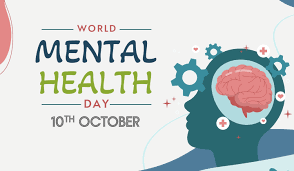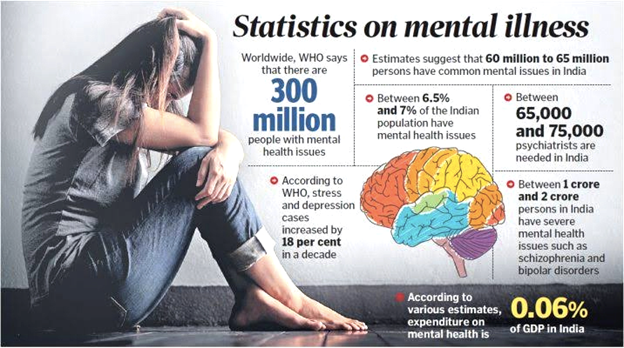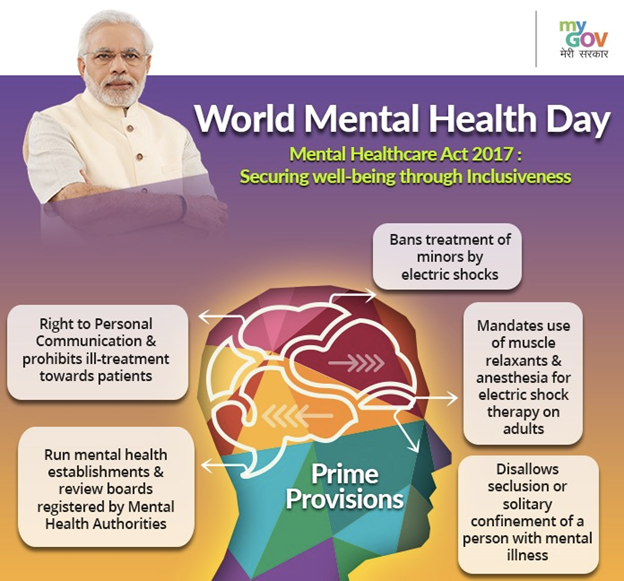Mental health and the floundering informal worker
Relevance
- GS Paper 2 Issues Related to Disability, Health.
- Tags:#Mental health, #Mental HealthCare Act 2017, #National Mental Health Program
Why in the news?
- Every year on October 10, we observe World Mental Health Day—an essential event dedicated to raising awareness and emphasizing the significance of mental health in both individual lives and society.
- This day strives to educate about the stigma surrounding mental illness, urging people worldwide to rally behind the cause and foster a nurturing environment in all facets of life to uphold mental well-being.
The theme of World Mental Health Day (October 10) this year is ‘mental health as a universal human right’.
- World Mental Health Day Color is “Green Ribbon”, a universal symbol for mental health awareness, and let your colleagues, loved ones, or even those you pass by know that you prioritize their mental well-being.
- Mental health: Mental health refers to a person’s emotional, psychological, and social well-being.
Key Findings
- A segment often overlooked when it concerns mental health is the informal worker. A study by the International Labor Organization (ILO) says that 15% of working-age adults, globally, live with a mental disorder.
- On one hand, decent work influences mental health in a positive way while on the other, unemployment, or unstable or precarious employment, workplace discrimination, or poor and particularly unsafe working environments, can all pose a risk to a worker’s mental health.
- Workers in low-paid, unrewarding or insecure jobs, or working in isolation, are more likely to be exposed to psychosocial risks, thus compromising their mental health.
Indian experience on Mental Health
- India’s informal workforce accounts for more than 90% of the working population. These workers often operate without regulatory protection, work in unsafe working environments, endure long hours, have little access to social or financial protections, suffer high uncertainty and deep precarity, and face discrimination .
- All of the above further undermine mental health and limit access to mental health care. Gender disparities are also stark, with over 95% of India’s working women engaged in informal, low-paying, and precarious employment, often without social protection, in addition to suffering patriarchal structures and practices in their social and familial spaces.
- According to the United Nations Development Programme (UNDP), unemployment and poor-quality employment have consistently been detrimental to mental health.
- The Lokniti group within the Centre for the Study of Developing Societies, which interviewed 9,316 youth aged between 15 to 34 years across 18 States in India, has shown that they are highly susceptible to negative emotions.
- Youth unemployment is one of the highest in India which, along with the stigma around unemployment, significantly impacts their mental health.
- Moreover, an ILO report highlights how young workers are shifting to more precarious and informal work, accepting less pay and poorer working conditions, out of desperation, and, sometimes, giving up and exiting the labour force altogether.
- The State of Inequality in India Report 2022 observes that the unemployment rate actually increases with educational levels, particularly for educated young women who show an unemployment rate of 42%.
- With this phase of demographic dividend, where half of India’s population is of working age and projected to remain so for two decades, it is pertinent to think about the quality of employment and long-term social security for them.
- India will also become an aging society in 20 years, with no apparent social security road map for this rapidly growing group that is especially vulnerable to poor mental health.
- The Census of India 2011 shows that 33 million elderly people are working post-retirement in informal work.
- Another study, by the ILO on elderly employment in India, shows high poverty among them, in terms of economic dependency and access to financial assets.
- The absence of proper financial and health-care security among the working elderly can severely impact their physical and mental health, aggravating their vulnerability.
World Mental Health Day 2023 10 Early Signs Of Depression
- Consistent feelings of sadness or emptiness.
- Loss of enjoyment in activities.
- Changes in eating habits and weight.
- Disruptions in sleep patterns.
- Fatigue or diminished energy levels.
- Challenges in focusing.
- Feelings of guilt, worthlessness, or hopelessness.
- Irritability or heightened anger.
- Social withdrawal.
- Recurrent thoughts of death or suicide.
Effective ways to prevent Mental Health
- Speak Out and Embrace Openness: Advocate for mental health awareness and maintain an open mindset towards mental health issues.
- Stay Informed about Warning Signs: Keep yourself informed about the warning signs and symptoms of mental illnesses, such as changes in sleep and eating patterns, persistent sadness, antisocial behavior, and mood changes.
- Show Kindness and Compassion: Cultivate kindness and compassion towards others, especially those dealing with mental health challenges.
- Promote Free Mental Health Screening: Actively support and promote free mental health screening, eliminating hesitation in seeking help.
- Participate in Awareness Campaigns: Engage in awareness campaigns and actively contribute to supporting the cause of mental health.
- Adopt a Healthy Lifestyle: Learn and implement a proper healthy lifestyle to enhance the mental well-being of both your family and yourself.
- Encourage Seeking Diagnosis and Support: Encourage and support those affected by mental health issues to seek proper diagnosis and access tailored mental health programs based on their signs and symptoms.
Initiatives are Taken by India to Promote Mental Health
- National Mental Health Program:
- To address the huge burden of mental disorders and shortage of qualified professionals in the field of mental health, the government has been implementing the National Mental Health Program (NMHP) since 1982.
- Mental HealthCare Act 2017:
- The Mental Health Care Act (MHCA) 2017 came into force in 2018 to meet the requirements of the United Nations Convention on the Rights of Persons with Disabilities which India ratified in 2007.
- Kiran Helpline:
- It offers mental health rehabilitation services with the objective of early screening, first-aid, psychological support, distress management, promoting positive behaviours, etc.
- Manodarpan:
- The Ministry of Human Resources Development (MHRD) (now Ministry of Education) launched it under Atmanirbhar Bharat Abhiyan. It is aimed to provide psychosocial support to students, family members and teachers for their mental health and well-being during the times of Covid-19.
- Mental Health and Normalcy Augmentation System (MANAS):
- In 2021, the government of India launched MANAS (Mental Health and Normalcy Augmentation System) mobile App to promote mental wellbeing across age groups.
- Constitution and Legal Provisions:
- Article 21: The right to a dignified life extends to the right to seek Mental Health care.
- Article 47: Duty of the state to raise the level of nutrition and the standard of living and to improve public health.
Conclusion
- Informal workers, despite their significant contribution to national income, are perennially exposed to various economic, physical, and mental vulnerabilities. India’s budgetary allocation for mental health (currently under 1% of the total health budget) has over-focused on the digital mental health programme.
- As the World Mental Health Report 2022 observed, addressing mental health involves strengthening community-based care, and people-centred, recovery-oriented and human rights-oriented care.
- There is an urgent need for proactive policies to improve mental health recognition and action.
- This is critical in upholding the basic human right to good health, including mental health, and in advancing the Sustainable Development Goals (SDGs), especially SDG 3 on ‘good health and well-being’ and SDG 8 on ‘decent work for all/economic growth’.
Source: The Hindu
Mains Question
With respect to Mental Health discuss why suicide among young people is increasing in Indian society and suggest some provisions and initiatives taken by the government to promote Mental Health in India.






